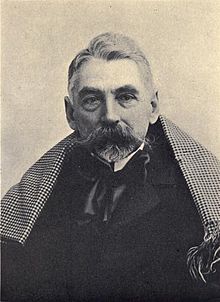Stephane Mallarmé
| Stéphane Mallarmé | |
|---|---|

Portrait of Mallarmé, by Nadar, 1896
|
|
| Born |
18 March 1842 Paris |
| Died | 9 September 1898 (aged 56) Vulaines-sur-Seine |
| Occupation | Poet |
| Nationality | French |
| Literary movement | Parnassian poets, Symbolist poets |
Stéphane Mallarmé (/mɑːlɑːrˈmeɪ/;French: [stefan malaʁme]; 18 March 1842 – 9 September 1898), whose real name was Étienne Mallarmé, was a French poet and critic. He was a major French symbolist poet, and his work anticipated and inspired several revolutionary artistic schools of the early 20th century, such as Cubism, Futurism, Dadaism, and Surrealism.
Stéphane Mallarmé was born in Paris. He worked as an English teacher and spent much of his life in relative poverty but was famed for his salons, occasional gatherings of intellectuals at his house on the rue de Rome for discussions of poetry, art and philosophy. The group became known as les Mardistes, because they met on Tuesdays (in French, mardi), and through it Mallarmé exerted considerable influence on the work of a generation of writers. For many years, those sessions, where Mallarmé held court as judge, jester, and king, were considered the heart of Paris intellectual life. Regular visitors included W.B. Yeats, Rainer Maria Rilke, Paul Valéry, Stefan George, Paul Verlaine, and many others.
On 10 August 1863, he married Maria Christina Gerhard. Their daughter, (Stéphanie Françoise) Geneviève Mallarmé, was born on 19 November 1864. Mallarmé died in Valvins (present-day Vulaines-sur-Seine) September 9, 1898.
...
Wikipedia
